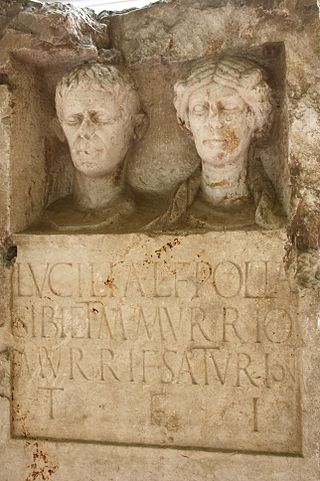Related Research Articles

The gens Lucilia was a plebeian family at ancient Rome. The most famous member of this gens was the poet Gaius Lucilius, who flourished during the latter part of the second century BC. Although many Lucilii appear in Roman history, the only one known to have obtained any of the higher offices of the Roman state was Lucilius Longus, consul suffectus in AD 7.
The gens Terentia was a plebeian family at ancient Rome. Dionysius mentions a Gaius Terentius Arsa, tribune of the plebs in 462 BC, but Livy calls him Terentilius, and from inscriptions this would seem to be a separate gens. No other Terentii appear in history until the time of the Second Punic War. Gaius Terentius Varro, one of the Roman commanders at the Battle of Cannae in 216 BC, was the first to hold the consulship. Members of this family are found as late as the third century AD.
The gens Visellia was a family at ancient Rome during the late Republic and early Empire. Two members of this gens achieved the consulship during the first century.
The gens Caesonia was a plebeian family of ancient Rome. They first appear in history during the late Republic, remaining on the periphery of the Roman aristocracy until the time of Nero. Roman empress Milonia Caesonia, the last wife of the emperor Caligula was presumably descended from the Caesonii, as she bore their nomen. Another family of Caesonii attained the consulship several times beginning in the late second century; it is not clear how or whether they were related to the earlier Caesonii.

The gens Maria was a plebeian family of Rome. Its most celebrated member was Gaius Marius, one of the greatest generals of antiquity, and seven times consul.
The gens Cincia was a plebeian family at Rome. The first member of the gens to achieve prominence was Lucius Cincius Alimentus, who was elected praetor in 209 BC.
The gens Egnatia was a plebeian family of equestrian rank at ancient Rome. Only a few of the Egnatii held any magistracies, of whom the most important may have been Gnaeus Egnatius, who held the praetorship during the second century BC, and served as governor of Macedonia, shortly after its institution as a Roman province.
The gens Tarquitia was a patrician family at ancient Rome. Few members of this gens appear in history, of whom the most illustrious was Lucius Tarquitius Fiaccus, who was magister equitum in 458 BC. Other Tarquitii are mentioned toward the end of the Republic, but were probably plebeians, rather than descendants of the patrician Tarquitii.
The gens Mummia was a plebeian family at Rome. Members of this gens are first mentioned after the Second Punic War, and within a generation, Lucius Mummius Achaicus became the first of the family to obtain the consulship. Although they were never numerous, Mummii continued to fill the highest offices of the state through the third century AD.

The gens Munatia was a plebeian family at Rome. Members of this gens are first mentioned during the second century BC, but they did not obtain any of the higher offices of the Roman state until imperial times.
The gens Oppia was an ancient Roman family, known from the first century of the Republic down to imperial times. The gens may originally have been patrician, as they supplied priestesses to the College of Vestals at a very early date, but all of the Oppii known to history were plebeians. None of them obtained the consulship until imperial times.
The gens Paccia, occasionally written Pactia, was a minor plebeian family at ancient Rome. Only a few members of this gens achieved distinction in the Roman state, of whom the most illustrious was Gaius Paccius Africanus, consul in AD 67.
The gens Paconia was a minor plebeian family at ancient Rome. No members of this gens obtained any of the higher offices of the Roman state in the time of the Republic, but Aulus Paconius Sabinus held the consulship in AD 58, during the reign of Nero.
The gens Papia was a plebeian family at ancient Rome. Members of this gens are first mentioned at the time of the Samnite Wars, but do not appear at Rome until the final century of the Republic. Marcus Papius Mutilus was the only member of the family to attain the consulship, which he held in AD 9.
The gens Satria was a minor plebeian family at ancient Rome. Members of this gens are mentioned in the first century BC, and under the early Empire, but none of them rose higher than the rank of praetor. Otherwise the Satrii are known largely from inscriptions.

The gens Saufeia was a minor plebeian family at ancient Rome. Members of this gens are first mentioned in the final century of the Republic, and from then to the early Empire their name occurs regularly in history, but none of them ever attained the consulship.
The gens Seia was a minor plebeian family of equestrian rank at ancient Rome. Members of this gens are first mentioned in the time of Cicero, and a few of them held various magistracies under the late Republic and into imperial times.
The gens Silia was a plebeian family at ancient Rome. Members of this gens are mentioned as early as the fifth century BC, but first to hold the consulship was Publius Silius Nerva, in the time of Augustus. The Silii remained prominent until the time of the Severan dynasty, in the early third century.
The gens Statia was a minor plebeian family at ancient Rome. Members of this gens are first mentioned in the early decades of the Republic, but the name does not appear again in history until the time of Cicero. The Statii remained relatively undistinguished until the reign of Trajan, when Lucius Statius Aquila was raised to the consulship.
The gens Turrania, occasionally written Turania or Tyrannia, was a minor plebeian family at ancient Rome. Members of this gens are first mentioned in the time of Varro, but none of them ever rose any higher than the praetorship.
References
- ↑ Cicero, Epistulae ad Atticum, xiv. 6, 10.
- ↑ Publius Cornelius Tacitus, Annales, xiii. 56.
- ↑ PIR, vol. III, p. 486.